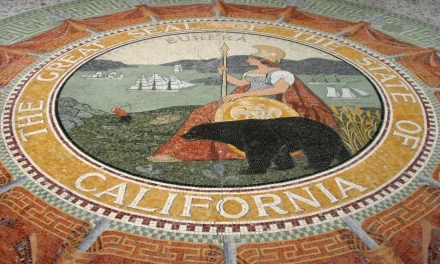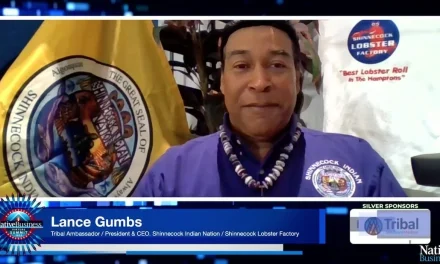The Nez-Lizer team distributed food, water, and other supplies to 837 Navajo Nation families in the communities of Chichiltah, Bááháálí, Red Rock, Manuelito, and Tsayatoh in New Mexico. (Courtesy Navajo Nation/Facebook)
“It is important to begin economic recovery efforts across the Navajo Nation because our economy is at the core of our survival as a Nation,” said Navajo Nation Vice President Myron Lizer.
As of May 5, a total of 2,559 COVID-19 cases and 79 deaths have gripped the Navajo Nation. Finally, $600 million in overdue funding is coming to the Tribe, courtesy of the Treasury’s move to release $4.8 billion immediately of the $8 billion Tribal set aside from the the Coronavirus Aid, Relief, and Economic Security (CARES) Act. U.S. Secretary of the Treasury Steven T. Mnuchin and Secretary of the Interior David L. Bernhardt announced yesterday plans to distribute 60 percent of the $8 billion to Tribes based on population data, and the remaining 40 percent based on the total number of persons employed by the Indian Tribe and any Tribally-owned entity.
“After non-stop consultation between the Navajo Nation and Council Delegates, the federal government has provided a lifeline for our People that will be put to immediate use in our efforts to stop the spread of COVID-19,” said 24th Navajo Nation Council Speaker Seth Damon.
“Today’s announcement is a significant step forward for the Navajo people. We have an unprecedented level of federal COVID-19 relief support, and now the Navajo Nation Council will act to make sure emergency resources get where they need to go — to Navajo communities,” said Council Delegate Nathaniel Brown, member of the Budget and Finance Committee. “This is particularly important for our traditional healers and spiritual practitioners of all faiths. We must ensure that we continue to observe the core values and practices of our Navajo culture.”
The Navajo Nation Council is currently finalizing legislation to formally accept the $600 million, as required by the Navajo Nation Code. The CARES Act funding requires Tribal Nations to spend the $600 million by December 30, 2020. Council delegates have previously discussed the needs of Navajo Nation communities and how best to support coronavirus responses at Navajo Nation health care facilities. The Navajo Nation Council also previously approved $4 million in Navajo Nation emergency funding for the Navajo Department of Health. That funding supported health care facilities in expanding their capacity, procuring personal protective equipment and other COVID-19-related relief activities.
The Navajo Nation, the largest reservation in the United States — covering an area more than 27,000 miles in New Mexico, Arizona, and Utah — has also been the hardest hit by the coronavirus. The Nation reported that as of May 5, 2020, they had a total of 2,559 COVID-19 cases and 79 deaths. And have administered a total of 15,651 tests with 11,609 negative results.
“Today’s announcement of funding for tribes is far too late. We’ve lost 79 lives so far and we have far too many of our people who have the virus,” said President Nez in a statement. “Had we received the funding when Congress approved it nearly six weeks ago, we might be in a better position today. Through the media, our congressional delegates, and letters to federal agencies, we’ve done our best to hold the federal government accountable and we will continue to do so.”
“As Navajo teachings tell us, one has to put a portion of the crop away for future use.” Nez said. “The Coronavirus Relief Fund will allow the Navajo Nation general fund to be held in abeyance while federal funds are used. Navajo Nation leaders and chapter officials should adhere to this wise Navajo teaching. We cannot have meetings for the sake of unplanned and unwise spending. The Executive Branch will provide a comprehensive plan for the effective use of these stimulus funds.”
The day of the CARES Act relief funding announcement, Navajo Nation Vice President Myron Lizer attended a roundtable discussion in Arizona with President Donald Trump while President Jonathan Nez was helping to distribute food and supplies to families on the reservation.
“It is important to begin economic recovery efforts across the Navajo Nation because our economy is at the core of our survival as a Nation. That is why we are working tirelessly to ensure the protection and health of our communities and Tribal members. We asked each of our stakeholders to report expenditures and total number of employees so we can begin understanding how COVID-19 has impacted employers, businesses, and sectors of the Navajo Nation government. With that information, we certified this data to the federal government. I am happy to see our efforts recognized with the announcement of over $600 million coming to the Nation. These funds are going to go a long way with providing government operations and services,” Lizer said in a statement.









